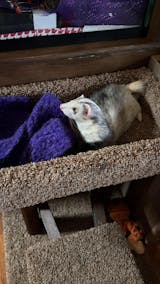The Best Ferret Food Guide: What Should Ferrets Eat for Optimal Health

Introduction
Ferrets may be small, but their nutritional needs are mighty. Many well-meaning ferret parents assume these playful companions can share snacks with cats or even enjoy fruits and vegetables. The truth? Ferrets are obligate carnivores, which means they thrive on a diet made up almost entirely of meat. Feeding them the wrong foods can lead to serious health issues and shorten their lifespan. Let’s break down exactly what your ferret should eat to stay healthy and happy.
Ferrets are obligate carnivores
In the wild, ferrets (and their close relatives, polecats) hunt and consume whole prey. Their bodies are designed to digest high-protein, high-fat, and low-carbohydrate meals. Unlike cats and dogs, ferrets cannot properly digest plant matter. Their short digestive tracts mean they process meat quickly and efficiently, but they struggle with carbohydrates and fiber.
The problem with fillers and low-quality kibbles
Many commercial ferret foods and treats contain fillers like corn, wheat, soy, or potatoes. These ingredients are inexpensive but completely inappropriate for a ferret's metabolism. Over time, consuming these fillers can lead to:
- Insulinoma (a cancer of the pancreas common in ferrets)
- Malnutrition
- Poor coat quality
- Dental problems
When selecting a food, check for high protein (over 35% minimum), high fat (at least 20%), and low to zero carbohydrates. Avoid anything with grains, fruits, or added starches.
Raw and freeze-dried diets: The gold standard
A properly balanced raw or freeze-dried raw diet is the closest option to a ferret’s natural prey diet. These diets provide highly bioavailable protein and fat sources and maintain vital nutrients.
Why Freeze-Dried Raw is the Best Ferret Food
When comparing ferret food options, freeze-dried raw consistently ranks as the best choice by veterinary nutritionists. Here's why:
- Nutritional Density: 65% protein vs 35-40% in premium kibbles
- No Harmful Fillers: Zero grains, corn, or sugars that cause insulinoma
- Digestibility: Matches ferrets' natural prey diet requirements
- Convenience: Shelf-stable without refrigeration needs
- Safety: Lab-tested for pathogens vs raw preparation risks
Developed with board-certified veterinary nutritionists specifically for ferret physiology, The Pampered Ferret's Dook Soup represents the gold standard in ferret nutrition and the best ferret food choice.
Choosing treats wisely
Treats can easily sabotage an otherwise healthy diet. Many commercial ferret treats include honey, fruit, dairy, or starches — all of which can harm your ferret’s health.
Instead, choose single-ingredient or high-meat content treats. Our lineup of freeze-dried raw treats (like bison kidney, pollock, and chicken hearts) and air-dried jerky treats support both nutrition and enrichment. Explore our treats.
Transitioning to a better diet
If your ferret is currently eating kibble or lower-quality foods, transition slowly over 1–2 weeks to avoid digestive upset. Gradually mix small amounts of the new food into the old diet, increasing the proportion every few days. Watch for improvements in energy levels, coat quality, and stool consistency.
Common questions
Q1: Can I feed my ferret raw chicken from the store?
Yes — raw meat like chicken thighs or hearts is appropriate, but make sure it is fresh, handled properly, and balanced with organ and bone components if fed long-term.
Q2: Do ferrets need vegetables or fruit?
No. Ferrets do not need (and cannot properly digest) plant matter. Avoid giving fruit or vegetables altogether.
Conclusion
Nutrition is one of the most important ways you can support your ferret’s health, happiness, and longevity. By focusing on high-quality, meat-based diets and treats, you’re setting your noodle up for a long, playful life.
Looking for more science-backed tips on ferret health and care? Explore The Ferret Education Corner for all our latest guides and articles including Caring For Senior Ferrets and The Truth about Ferret Treats.



